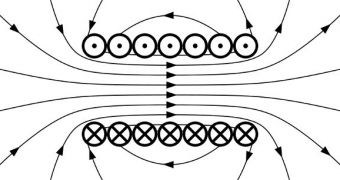Investigators at the University of York Department of Physics led an international collaboration of researchers who recently announced the development of an improved method for magnetic recording. The achievement could be used to develop very advanced hard drives, as well as other devices.
Information stored on such hard drives will be processed hundreds of times faster than that located on existing devices. The revolutionary method is described in the February issue of the top scientific journal Nature Communications.
Investigators from Spain, Switzerland, Ukraine, Russia, Japan and the Netherlands were involved in the research. The main portions of the study were carried out at the Paul Scherrer Institut, the Russia Academy of Science's Ioffe Physical Technical Institute and the Radboud University Nijmegen.
What the new approach does is take a new way towards addressing the manner in which a single bit of data is inscribed in a magnet. Until now, the prevailing view has been that an external electrical field is required in order to invert the polarity of two magnetic poles.
This process led to either storing or retrieving that particular bit of information. Now, experts propose that ultrashort heat bursts can be used for the exact same purpose, except more efficiently and faster.
“Instead of using a magnetic field to record information on a magnetic medium, we harnessed much stronger internal forces and recorded information using only heat,” explains Thomas Ostler, who is a physics expert at the York University.
“This revolutionary method allows the recording of terabytes of information per second, hundreds of times faster than present hard drive technology. As there is no need for a magnetic field, there is also less energy consumption,” he adds.
“For centuries it has been believed that heat can only destroy the magnetic order. Now we have successfully demonstrated that it can, in fact, be a sufficient stimulus for recording information on a magnetic medium,” RUN Institute of Molecules and Materials expert, Dr. Alexey Kimel, says.
All that remains now is for experts to create a production process that would use this approach. Future hard drives of large capacity (several terabytes or larger) could benefit extensively from the ability to secure so much data at great speed, Science Daily reports.

 14 DAY TRIAL //
14 DAY TRIAL //